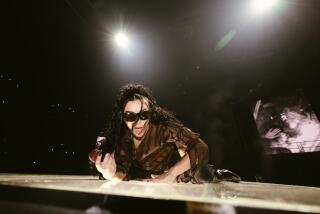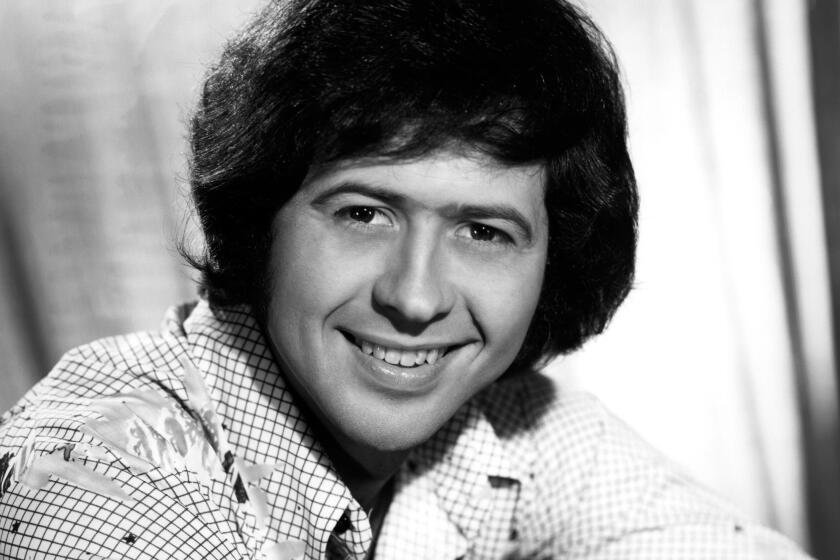A Jolting Reminder for Los Angeles’ Argentines : Pop music: Charly Garcia’s Palace show tonight is a return for his fans to a time when rock was the only means of communication in a region plagued by dictatorships.
- Share via
“Charly? Charly is playing on Thursday?”
That’s being heard a lot lately among Los Angeles’ Argentine residents up to age 45 or so. For them, and some South American neighbors, Charly Garcia’s L.A. debut at the Palace tonight means nothing less than an unexpected, jolting return to the bittersweet days of adolescence--a time when the beauty of Argentine rock was the only means of communication in a continent plagued by military dictatorships.
Of the several artists that graced Argentina’s rock nacional since the late ‘60s, the keyboardist-guitarist-singer-songwriter was arguably the most talented and undoubtedly the most controversial.
“My career is full of scandals, but many of them never existed,” said Garcia, 41, during a recent phone interview from Buenos Aires, where he lives. “The media’s overreaction to my lifestyle is normal in a place like this, but if I were to live in Los Angeles I would go unnoticed.”
Garcia was alluding to the flamboyance, unpredictability and well-publicized drug problems that kept him firmly in the public eye. Both his persona and his music were the symbols of Latin America’s strongest rock tradition, and many of today’s rockeros , including the major star Fito Paez, owe much to Garcia.
He wrote classic songs mixing the traditional ingredients of Argentina’s rock--folk-rock, rock, pop and tango--with unparalleled creativity. His lyrics, dealing mostly with love and everyday reality in Buenos Aires, are sometimes abstract and sometimes bold, but always witty.
“In those dark years of the ‘70s, it was impossible to say things,” he said, referring to the censorship of the period’s military government, whose rule effectively ended with the 1982 Falklands War. “We had to write our lyrics with codes, and maybe that’s why our rock didn’t spread elsewhere earlier. Our message was very local.”
His Palace show will focus on highlights from his work with Sui Generis (a duo he formed with Nito Mestre in the early ‘70s and dissolved in 1975), La Maquina de Hacer Pajaros (a more fusion-oriented quintet) and Seru Giran (Argentina’s most successful rock band), as well as his acclaimed solo work. It will be an emotional review of the music that made him rock nacional’s most valuable icon.
“I want to close that chapter of my life playing my best songs, not the flashiest,” he said. “I’ll sing those songs that survived all these years.”
But Garcia’s visit, with all its expectations, has also been tainted by a certain skepticism. Since the late ‘80s, a sector of the Argentine press has been covering Garcia’s drug problems in a sensational fashion that described him as little more than a junkie ready to die at any moment.
In fact, Garcias popularity did wane a bit, as Fito Paez assumed the top position in Argentine rock. But after successfully treating his drug problems, Garcia made an impressive return to the spotlight.
Today Garcia sounds in good spirits and claims to be ready.
“My health is fine, and that’s the most important thing. I’m in a good mood and want to play a killer concert.”
Still, his reputation as a troublemaker and drug user, fueled by the nation’s personality-oriented weekly tabloids, persists.
“I have fun while my family and friends worry,” Garcia said. “And the worst thing of all this is that (the press) writes some crap about me and then they call me to see whether I want to ‘answer the charges,’ so that they can sell more magazines. That’s why I won’t talk to them, and that’s why some writers don’t like me while others adore me.”
More to Read
The biggest entertainment stories
Get our big stories about Hollywood, film, television, music, arts, culture and more right in your inbox as soon as they publish.
You may occasionally receive promotional content from the Los Angeles Times.










